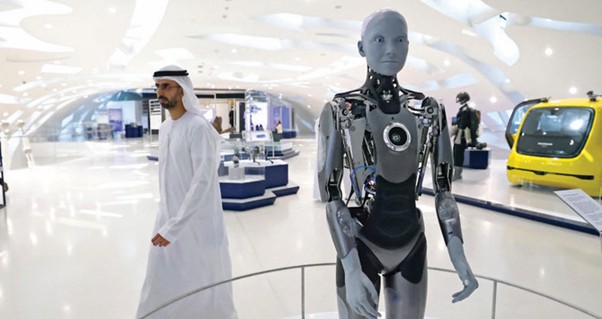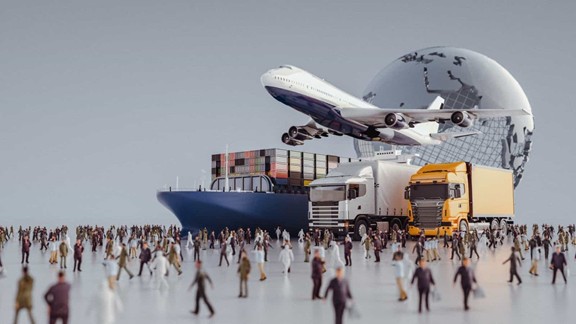Cairo
Source: Al-Wafd Newspaper
Prof. Dr. Ali Mohammed Al-Khouri
In 2025, the global economy entered a new phase of transformation, imposing its influence on decision-making centers and trade policies around the world. Arab countries were no exception. The United States revived its protectionist tools and imposed strict tariffs on a number of its trading partners, including tariffs exceeding 100% in its dealings with China. This shift cannot be viewed solely on the surface as abstract tariff policies. In essence, it reflects a deeper shift in American economic philosophy, carrying implications that extend beyond bilateral relations and requiring other countries, including Arab countries, to re-prioritize and adapt their development models to a more turbulent international environment.
What is concerning is that some of these tariffs may extend to Arab exports to the US market, potentially weakening their competitive position in this market, which remains an important trade outlet for some Arab economies. For example, Egyptian textile and Jordanian pharmaceutical exports have been subject to high levels of tariffs, undermining their ability to remain competitive compared to similar products from countries not subject to the same restrictions. This reality presents decision-makers with a crucial question: Do Arab countries possess the strategic flexibility to absorb the shock and even transform it into an opportunity to rebuild their economic model on a more balanced and independent basis?
What’s most worrying in this context is not only the loss of preferential access to the US market, but also the indirect impact on import costs. Washington’s imposition of tariffs on imports from major countries like China and the European Union results in higher costs for products that transit through the United States or rely on its components. Sectors such as electronics, vehicles, and construction goods are among the most vulnerable to these changes, especially in the Gulf states, which import large quantities of these products as part of their development plans.
But a risk that extends beyond mere trade volatility is the potential for a global economic slowdown caused by an escalating trade war, which could lead to disruptions in supply chains and a decline in demand for oil and gas. This scenario would be particularly worrisome for rentier states that rely on energy exports, as the contraction in global demand would lead to financial pressures, forcing these countries to choose between continuing to spend on major projects or maintaining fiscal balance. This choice is made all the more dangerous by the prospect of a decline in remittances from Arab workers abroad, as a result of the slowdown in Western economies themselves.
Regional markets reflected the fragility of this volatile environment. With the US announcing new tariffs in April 2025, Middle Eastern stock markets registered sharp declines and experienced rapid sell-offs, reflecting widespread investor anxiety. The lack of certainty about the trajectory of trade policies creates a climate of hesitation in investment decisions and could lead to capital flight from developing economies, which in turn will pressure currency exchange rates and governments’ ability to finance their development plans.
However, at the heart of the crisis also lies a window of opportunity. Exceptional circumstances often provide a window to rethink and restructure economic paths. For Arab countries, this crisis could represent a powerful incentive to reduce reliance on traditional patterns based on exporting raw materials and move toward building more diversified and robust economies in non-oil sectors, such as technology, the green economy, advanced industries, and the knowledge economy. Furthermore, the withdrawal of some global companies from the United States to avoid tariffs may push them to seek new production sites, opening the door to countries with an advantageous geographical location and labor force, provided they provide a favorable legislative environment and infrastructure.
US tariffs may also contribute to reviving regional trade by encouraging Arab countries to develop their domestic markets and intensify their cooperation within the framework of a more integrated and resilient Arab economic zone. Developing alternative strategies for opening up to markets in Africa, Asia, and the Global South could represent an effective response to the blockage of some traditional trade channels and provide Arab economies with an opportunity to break out of the margins to which they are placed within the international trading system.
However, achieving this requires a strategic repositioning that goes beyond circumstantial policies. What is required is not only the search for new partners or alternative markets, but also a restructuring of the entire Arab economic model. This begins with a careful reading of the map of sectors most affected by tariffs, and the development of support tools tailored to the specificities of each sector. This is coupled with a comprehensive review of quality, cost, and competitiveness policies, and the restructuring of production institutions to enable them to withstand a changing environment.
Moreover, dealing with the United States should not be limited to a negative or escalatory response, but rather to building a balanced negotiating position based on shared interests, opening channels of dialogue to deconstruct the motivations behind new policies, and exploring areas of possible cooperation in light of the ongoing changes.
In conclusion, it can be said that the tariffs imposed by the United States, despite their apparent severity, pose a multi-dimensional strategic test for the Arab world. They can either be viewed as a threat that imposes contraction and retrenchment, or as an opportunity to redirect the compass of development beyond traditional circles. The current moment requires a different reading, one that goes beyond managing the crisis, but rather seeks to harness it as the beginning of a new phase, one that is more independent and more integrated into alternative economic spaces, redefining the Arab region’s position in the global economy.
Perhaps the most important question that should be asked today is not: How do we protect ourselves from the storm? Rather, it is: How do we build our own boats so that we can sail with greater confidence in a world where stability has become the exception and transformation is the norm.











